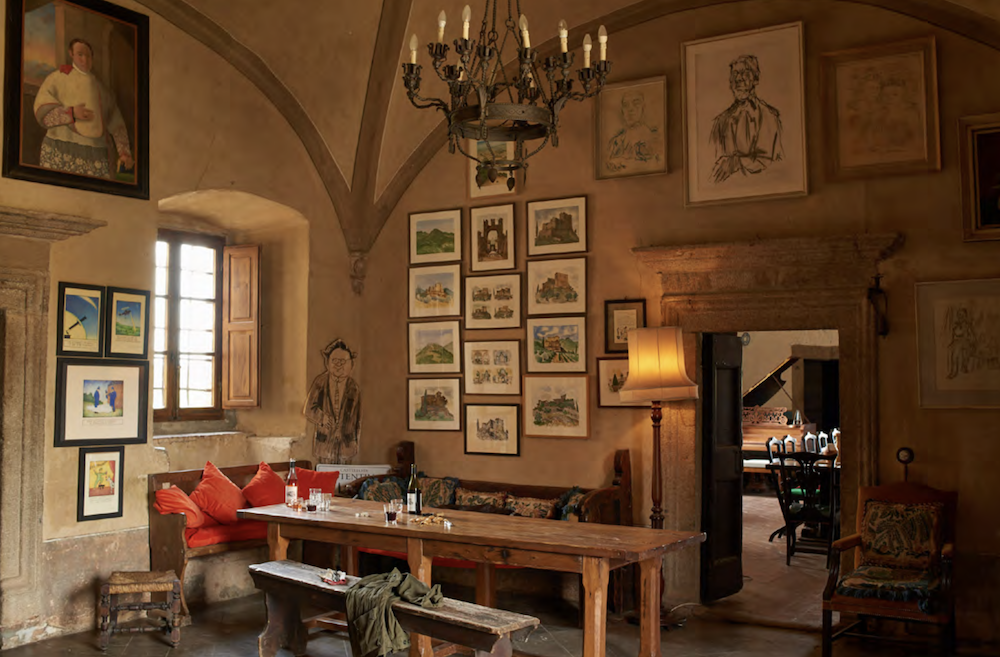by Malcolm Jolley
Tony de Luca got his start in the restaurant business one afternoon, when he came home from school. The 12 year old noticed a line of cars outside the restaurant his Italian emigre parents had just opened, and as soon as he crossed the threshold, his mother pressed him into the kitchen brigade to make Caesar salads. After a seven hour shift, he was physically exhausted, but mentally invigorated and the fiftysomething chef and author hasn’t looked back since.
Chef de Luca owns and operates two restaurants in Niagara-on-the-Lake: de Luca’s Wine Country Restaurant and, the more casual, Trattoria-style, Old Winery. Italian-born, he hails from just north of Toronto (having come over at the age of four) and he’s cooked in some of the GTA’s most prestigious kitchens, but Niagara (or more specifically the parts of it we call ‘Wine Country’) is the place he is now most identified with, since he travelled down the QEW to accept the job as Chef at Hillebrand’s new showcase winery in 1996. Simply in Season: 12 Months of Wine Country Cooking is his second cookbook, and the first since he’s operated as an independent. It’s a fine dining inspired book, which is attached to the concept of eating locally and with the seasons. It’s also high-production-value Canadian cookbook that’s been published indepently of any TV show or strategy to conform to lowest common demoninator cooking (there’s no “quick, easy, yummo” stuff going on). Instead, de Luca showcases the sort of fine dining he’s developed in his 30 year career, cooking at culinary hot spots like The Windsor Arms, Langdon Hall and the Milcroft Inn.
The recipes are sophisticated: de Luca’s reader is expected to go to market to find king oyster mushrooms, or Lake Erie whitefish for a ‘Niagara Bouillabaisse’. I met him for lunch in Toronto recently, and I said to him something along the lines of that it was nice to see a cookbook written for grown-ups, for people who actually like to cook. de Luca replied that he just hoped he didn’t “intimidate” anyone, adding that although the ingredients might sometimes require a special trip, the technique was always quite straight forward. “I just want to bring some basic concepts to light.”
Although the title seems to be a play towards trendy locavorism, de Luca cheerfully denies any hard-sell proselytising. “Look,” he explains, “I’m Italian: we’ve been eating local and in season for a thousand years! In Italy they think it’s kind of funny that we’re just discovering local food in North America.” He does admit, though, that his ingredient driven cuisine came about by way of evolution: “We were not trained to source locally, when I was starting out. And we didn’t really care very much about the vegetables. The person, I think, who changed this was Alice Waters [of Chez Panisse, in Berkeley, California]. First of all, she cooked in blue jeans, and so did Jeremahia Tower. That was amazing and it brought on that whole Cal-Italo way of cooking where ingredients are so important, that I love.”
de Luca also credits his stint at Hillebrand, and the tutelage he recived from the Peller family who own and run it, as crucial to the development of his interest in local, seasonal cuisine. Not just because they physically brought him to Niagara, but also because “with the VQA movement the Niagara wineries started to go for premiumization: they raised the bar of their wines and the chefs and farmers came match it.”
In Niagara, de Luca has managed to survive the triple threat of 9/11 (and mandatory passports for border corssings), SARS and dollar parity. That customer base is replaced by food and wine enthusiasts from Toronto and Southern Ontario, as well as Western New York, as the region develops as a culinary tourist destination.
Simply in Season is organised by month. While this is not an entirely new concept, it’s rare for a Canadian book and a treat to read an ingredient-driven set of recipes that match availability here. But the book is more than a collection of recipes. Scattered throughout are pieces of poetry, written by de Luca’s cousin, Maria Giulliani, which add a lyrical touch. There are also notes from the chef on each recipe, often with a charming anectdote as well as a few pictures taken from his storied career. And there is quite an introduction. de Luca tells his story of becoming a chef in a long-form intorduction that serves as wonderful mini-history of the Toronto and GTA dining scene. All of this makes the book as much a pleasure to read as to cook from.
Malcolm Jolley is the editor of Good Food Revolution.









http://hotanddirtyinthekitchen.com/?p=735
I reviewed your establishment based on my visit yesterday. Thanks!